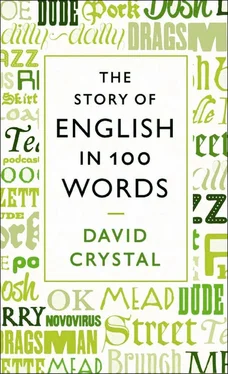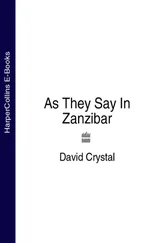It’s much easier to have DNA as the heading for a chapter on scientific words than its full form: deoxyribonucleic acid. Far more people will recognise the first than the second. But both versions are typical of the way scientific language works. On the one hand, we find lengthy compound words; on the other, we find the abbreviations that make it possible for us to talk about these things without running out of breath.
Who knows how many scientific terms there are in English? One of the leading chemical dictionaries contains the names of around half a million compounds. How many species of insect are there? Well over a million have so far been identified. Plant species? Around 400,000. Presumably each of them has a name. There’s little point in asking questions about totals when such large numbers are involved. No dictionary could ever hope to include them all ( §60).
What general dictionaries do is include the terms from science and technology that are likely to have some currency outside of their specialised source. But even here the numbers are substantial. It’s thought that around 80 per cent of the words in an unabridged English dictionary are going to be scientific terms. Where do they come from?
A large number come from Greek or Latin — anatomical terms, for example, such as abdomen, femur , vertebra, cerebrum, trachea and thyroid . But far more are the result of stringing together separate roots to make compound words of sometimes extraordinary length. De-oxy-ribo-nucle-ic is already quite complex at five elements. And that’s the short version. In its full form it’s actually cited as the longest scientific name by the Guinness Book of Records , with 16,569 elements.
Prefixes and suffixes are especially important. Scientific terms, of course, use everyday prefixes, such as pre- , un- and de- , but several have special scientific relevance. For example, great use is made of prefixes that express numbers ( bi- , mono- , poly- ) and metrical quantities ( nano- , micro- , pico- ). Some of these are becoming more familiar from their use in computing ( §99). A few years ago, prefixes such as kilo- , mega- and giga- would have been obscure to most people, but today, thanks to kilobytes , megabytes and gigabytes , they are in everyday use.
The -ic of nucleic is one of several suffixes we associate with chemistry. Others include the -ene of acetylene and benzene , the -ol of ethanol and alchohol , the -ium of chromium and sodium and the -ate of nitrate and sulphate . But each science has its own distinctive forms, as suggested by botany’s spermatozoid , geology’s cretaceous and zoology’s stegosaurus . Indeed, some of these suffixes are so distinctive that they can prompt errors in the unwary. In 2010 it was reported that a student, in an essay, thought a thesaurus was a species of dinosaur from Jurassic Park .
 76. Garage — a pronunciation problem (20th century)
76. Garage — a pronunciation problem (20th century)
Words are identified through their spelling and their pronunciation, so it’s a natural tendency to think that both are fixed. In fact, spelling often varies, as we have seen ( §51). And we tend to underestimate the amount of variation that exists in pronunciation.
Choices vary between British and American English. Sometimes it’s a straight swap: tomahto in Britain, tomayto in the US; the first syllable of yoghurt in Britain with the vowel of dog and in the US with the vowel of oh . Some US pronunciations have taken root in Britain: I normally say schedule with a sh- , but my children all say it with a sk- . As a result, I now use both pronunciations, and never quite know which one is going to pop up next in my speech.
In other cases, the situation is more complicated, because one of the dialects has alternatives. In British English, vase is ‘vahz’, whereas in American English some people say ‘vaze’ (rhyming with haze ) and some ‘vace’ (rhyming with place ). Conversely, in American English glacier is pronounced ‘glaysher’, whereas in British English it is either ‘glassier’ or ‘glaysier’. Garage is like glacier . In America it is ‘garahge’, with the stress on the second syllable. In Britain it is either ‘ garahge’ or ‘ garridge’.
Garage is a good word to choose as a reminder that pronunciation is always changing. When the BBC was formed, it set up an Advisory Committee on Spoken English to advise announcers how they should pronounce words which were unfamiliar or had competing usages. In their 1926 publication, they recommended ‘garahge’. But by 1931 the members of the Committee had changed their mind. They say, ‘ Garage has been granted unconditional British nationality, and may now be rhymed with marriage and carriage .’ Both pronunciations are still heard today.
Several of the other BBC recommendations of the 1920s have long disappeared. They thought fetish should be pronounced ‘feetish’, and Celtic (the race, not the football team) as ‘seltic’. They opted for airplane , not aeroplane . And they sometimes put the stress in places where hardly anybody — perhaps nobody — would put it now, such as acumen , anchovy and precedence . I have to say ‘perhaps’, because the old pronunciations could still be in the consciousness of some senior citizens, much as some continue to say ‘forrid’ for forehead .
Over half the words in a Pronouncing Dictionary will display alternative forms, though in many cases the differences are slight. Here are some of the more noticeable ones. Do you say the first letters of either with the sound of the vowel in see or in sigh ? Do you say example with the a as in cat or as in calm ? Envelope with the e of hen or the o of on ? Greasy with the s of see or the z of zoo ? Is it a hotel or an ’otel — or even an hotel ? Does tortoise rhyme with bus or voice ? Some stories depend on these variations, such as the one about the child who heard a priest ask the congregation to say ‘the prayer that Jesus taught us’ and wondered why Jesus had a pet. People who say tortoice don’t seem to find it funny.
 77. Escalator — word into name into word (20th century)
77. Escalator — word into name into word (20th century)
Imagine you invent something and you want to give it a name — say a device which automatically repairs non-functioning keys on computer keyboards. You think up a word which you think suits the product — Keefiks , shall we say, based on key + fix — check it hasn’t been used by anyone else, protect it by registering a trademark and go into business. It takes off. You sell millions. And before you know it, the name has become part of the language. People talk about keefiksing their machines. The word becomes a metaphor. People start saying such things as I’m keefiksing my apartment and I need a spiritual keefiks .
Читать дальше

 76. Garage — a pronunciation problem (20th century)
76. Garage — a pronunciation problem (20th century) 77. Escalator — word into name into word (20th century)
77. Escalator — word into name into word (20th century)










